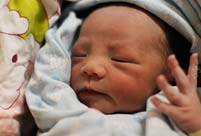 PLA aerobatic team arrives in Russia for air show
PLA aerobatic team arrives in Russia for air show
 Enjoy your time in Maldives
Enjoy your time in Maldives
 Tranquil scenery of Baiku Co Lake in Tibet
Tranquil scenery of Baiku Co Lake in Tibet
 Indian-controlled Kashmir celebrates Independence Day
Indian-controlled Kashmir celebrates Independence Day
 Lady of mystery: Female SWAT team in prison disclosed
Lady of mystery: Female SWAT team in prison disclosed  Art-like scenery of Zoige
Art-like scenery of Zoige
 How do North Koreans stay cool in summer?
How do North Koreans stay cool in summer?
 Reservoirs in S China start to release floods
Reservoirs in S China start to release floods
 Top 10 naked hotels in the world
Top 10 naked hotels in the world
A mother's genes can affect the aging process in her children, according to a new study in mice as quoted in media reports Friday.
Researchers at Karolinska Institute, Sweden, found that mutations in mother mice resulted in age-related problems in their offspring.
They found that damage to mitochondrial DNA, that is passed down from mothers, leads to aging more than mutations in the cell's nucleus.
"If we inherit mDNA with mutations from our mother, we age more quickly," said lead study author, Professor Nils-Goran Larsson.
Normal and damaged DNA is passed down between generations. However, the question of whether it is possible to affect the degree of mDNA damage through lifestyle intervention is yet to be investigated.
All that the researchers know now is that mild DNA damage transferred from the mother contributes to the aging process.
"The study also shows that low levels of mutated mDNA can have developmental effects and cause deformities of the brain," said author Jaime Ross, Ph.D., at the Karolinska Institutet.
"Our findings can shed more light on the aging process and prove that the mitochondria play a key part in aging; they also show that it's important to reduce the number of mutations," said Larsson.
"These findings also suggest that therapeutic interventions that target mitochondrial function may influence the time course of aging," said Barry Hoffer, M.D., Ph.D., a co-author of the study from the Department of Neurosurgery at University Hospitals Case Medical Center and Case Western Reserve University School of Medicine.
The data published come from experiments on mice. The researchers now intend to continue their work on mice, and on fruit flies, to investigate whether reducing the number of mutations can extend their lifespan.
 Premier Li: We rely on farmers for a living
Premier Li: We rely on farmers for a living Top 10 Chinese provinces for the well-heeled
Top 10 Chinese provinces for the well-heeled  Fan Bingbing poses for Malaysian magazine Citta Bella
Fan Bingbing poses for Malaysian magazine Citta Bella Enjoy your time in Maldives
Enjoy your time in Maldives Wild dream: Hell-like training for bodyguard
Wild dream: Hell-like training for bodyguard  Zhang Xinyi covers COSMOPOLITAN
Zhang Xinyi covers COSMOPOLITAN China’s weekly story
China’s weekly story  The story of a savior sibling
The story of a savior sibling A collection of bizarre rooftop buildings around China
A collection of bizarre rooftop buildings around China Chinese naval escort taskforce conducts live-fire training
Chinese naval escort taskforce conducts live-fire training Maldives - the best destination for snorkeling
Maldives - the best destination for snorkeling Group wedding ceremony in Xinjiang
Group wedding ceremony in Xinjiang The world's biggest pure gold mascot
The world's biggest pure gold mascot Those embarrassing copycat buildings
Those embarrassing copycat buildings Weekly Sports Photos
Weekly Sports PhotosDay|Week|Month